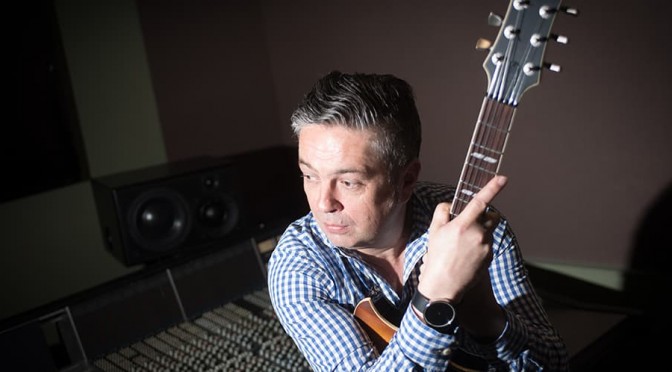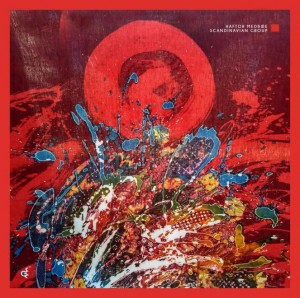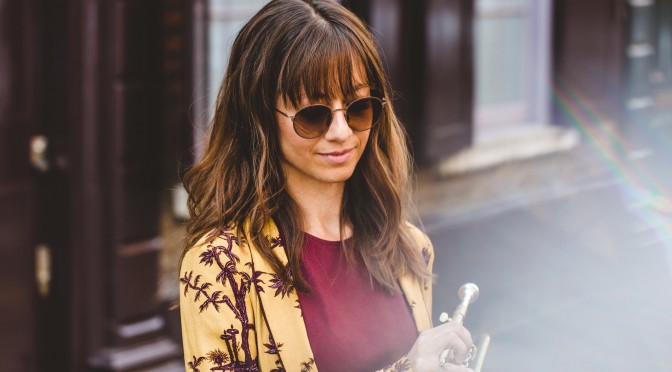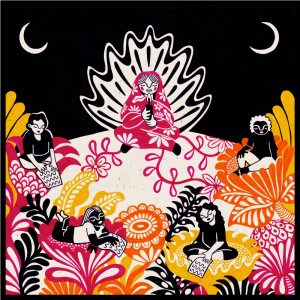Subcontinental records from Bangalore has released a beautiful live album of Norwegian guitarist and composer Haftor Medbøe. Haftor lives and works in Edinburgh, Scotland and the concert was recorded there back in July 2013. Funded by the Scottish Government Haftor was able to assemble a band of musicians that he’d always wanted to work with. From Norway came pianist Espen Eriksen and trumpeter Gunnar Halle, and from Denmark bassist Eva Malling and drummer Benita Haastrup.
Haftor has more details: “On the night of the performance we were joined by Scottish/Polish saxophonist Konrad Wiszniewski for one track. He had another gig at almost the same time so immediately after playing one song he had to run half a mile to be on time for his other performance. The band rehearsed all-new material for an hour on the day before the gig and spent that evening bonding over dinner and some beers”.
The album starts with “New Happy” featuring Konrad Wiszniewski on saxophone. He plays the first solo and he receives excellent support from the band so we feel the energy he puts into his playing. this solo is already my first highlight on the album.
After saying goodbye to Konrad With “Run, Konrad, run”, the band continues as a quintet with “Bruichladdich10″ which refers to the whisky with the same name. The beautiful melody is played softly by Gunnar Halle on trumpet, piano and guitar have solo parts before we hear an open and very rhythmic outro dominated by the trumpet. The free and open playing culminates in a grand finale.
“Minor is the New Major”, the title song of the album comes next. A soft song with another great melody presented by trumpet and guitar. Haftor plays the solo on this song with a distorted guitar sound and a free rhythm section accompanying him. Very interesting to listen to the ideas of the band members. Espen Eriksen takes the lead after the guitar solo and the song ends with the melody played again.
“More Viking Than You” starts with a bass solo. The melody is played initially by trumpet (with some effects) and piano only. This song sounds like made for a movie with a strong piano and a trumpet floating over the rhythm section. Breathtaking. The solo goes to Haftor Medbøe. He stays calm and soft and the floating trumpet returns which keeps the visual character of the song.
“Steaks & Muscles” comes next. The intro goes to the piano, the melody is played by the guitar and this song modulates nicely between major and minor chords. Piano and bass play a striding riff which is used by the guitar as base to improvise before the solo becomes free and open again. The trumpet sound is electronically altered which creates some very interesting and unusual effects.
“Broadcast For The World” is a beautiful and very harmonic ballad. The melody is played by trumpet and guitar with great support by Espen Eriksen on piano who also plays a brillant solo. This song is definitely the highlight of the album, it is so easy to follow and it is played with great sensitivity and aesthetics.
The album ends with “These Little Things” which is based on a interesting guitar riff. The band shows again how precise they can play and how perfect they can change their dynamics.
The compositions from Haftor Medbøe have all great and easy to follow melodies and the band received a lot of freedom to take the material and improvise rather freely over it without stretching these improvisational parts into excess length. The music hasn’t collected any dust in this six years between recording and releasing and you feel the fun and energy in this album. Thanks to Subcontinental Records who convinced Haftor Medbøe to release this live recording.
Haftor is not only a great composer and an excellent musician, he is also an internationally published researcher in the field of jazz studies and has presented conference papers throughout Europe. If you want to learn more about his work, his projects and his music please check out his website:
http://www.haftormedboe.com/
And finally a playlist of this album on Spotify:



